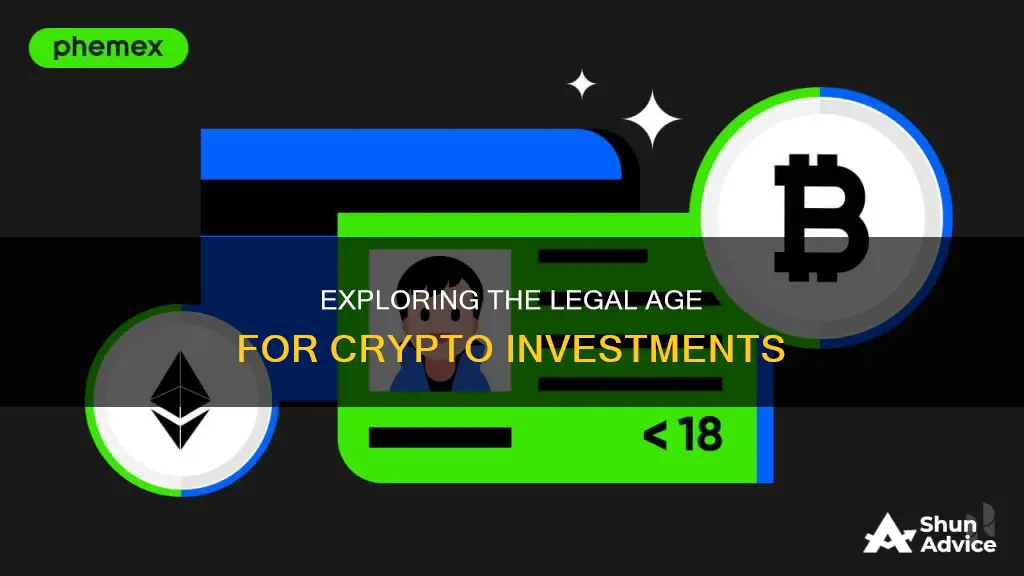
There is no minimum age to use cryptocurrency, but many crypto apps and exchanges require users to be 18 or older. While there are no laws against minors investing in cryptocurrencies, most U.S.-based crypto exchanges have an age limit of 18. This is because, in most countries, a person is considered mature and able to take full responsibility for their finances when they reach the age of 18 or 21. As a result, minors often need help from their parents or guardians to invest in cryptocurrencies.
| Characteristics | Values |
|---|---|
| Age limit for trading or mining cryptocurrencies | There is no age limit for trading or mining cryptocurrencies. |
| Age limit to open a bank account | 18 or 21 years old |
| Age limit to buy crypto on leading exchange platforms | 18 or 21 years old |
| Age limit to buy crypto on decentralised exchanges | None |
| Age limit to buy crypto on peer-to-peer exchanges | None |
| Age limit to buy crypto with fiat currency | 18 or 21 years old |
| Age limit to buy crypto with a bank card | 18 or 21 years old |
| Age limit to buy crypto with a bank account transfer | 18 or 21 years old |
| Age limit to buy crypto with a crypto gift card | None |
| Age limit to buy crypto with a crypto ATM | None |
What You'll Learn

No age limit for owning crypto
While there are no laws against minors investing in cryptocurrencies, there are some barriers to entry. Many US-based crypto exchanges require users to be at least 18 years old. These platforms are typically regulated, centralised cryptocurrency exchanges.
However, there is no age limit for owning or trading cryptocurrencies. This is because, in theory, anyone can own crypto as it is a digital currency based on the blockchain.
Minors can legally invest in crypto in several ways. Firstly, they can use a crypto ATM, which is similar to a regular cash machine but allows users to buy or sell cryptocurrencies using cash. Secondly, they can use peer-to-peer trading platforms, which are much less strict in their requirements and do not require identity verification. Thirdly, they can use decentralised exchanges, which are crypto-asset trading applications that do not store user funds or control transactions. Finally, they can receive crypto payments for work or freelancing in the IT and crypto sectors.
The role of parents
Parents can be involved in their child's financial upbringing in several ways. For example, they can help to buy their child's first crypto portfolio or invest in educational courses. They can also give their child a cryptocurrency gift card, which can be freely transferred anywhere in the world.
The importance of financial literacy
It is crucial for minors to conduct thorough market research and involve themselves in the learning process before investing in crypto. Adolescence is a good time to start getting acquainted with the basic principles of the economy, stocks, deposits, and dividends. While crypto is an innovative and exciting prospect for young investors, it is a high-risk and mostly unregulated space. Therefore, teens should not invest more than they or their parents are willing to lose.
Strategic Bitcoin Investments: Growing Your Money
You may want to see also

Minors can invest with guardian support
While there are no laws prohibiting minors from investing in cryptocurrencies, many US-based crypto exchanges require users to be at least 18 years old. This is because, in most countries, a person is considered mature and able to take full responsibility for their finances once they reach the age of 18 or 21. As a result, minors often need guardian support to invest in crypto.
Minors can invest with the help of their parents or guardians, who can open a custodial account on their behalf. A custodial account is an adult-managed investment account that allows parents or guardians to invest on their child's behalf, with the assets legally belonging to the child. For example, platforms like EarlyBird offer custodial accounts that support crypto investing. Parents can deposit funds into these accounts and choose to invest in cryptocurrencies like Bitcoin or Ethereum.
Additionally, minors can use decentralised exchanges to invest in cryptocurrencies. These exchanges are unregulated, so there are no age limits, and teens can connect their digital wallets to trade cryptocurrencies. However, these exchanges are highly risky, and it is difficult to exchange fiat currency for crypto on these platforms.
It is important to note that crypto investing is high-risk and mostly unregulated. Therefore, teens should only invest amounts that they or their parents are willing to lose.
Billionaires Who Have Invested in Bitcoin
You may want to see also

Crypto exchange age restrictions
There is no law prohibiting minors from investing in cryptocurrencies. However, many crypto exchanges require users to be at least 18 years old. This is due to the regulatory framework and compliance guidelines that these platforms must adhere to. These platforms use Know-Your-Customer (KYC) protocols and identity verification processes to ensure users are of legal age. As a result, minors cannot open user accounts or invest in cryptocurrencies directly through these platforms.
Alternative Options for Minors
Minors can still invest in cryptocurrencies through alternative methods, such as:
- Decentralized exchanges: These are unregulated and do not have age restrictions. However, they only allow transactions in cryptocurrencies, not fiat currencies.
- Peer-to-peer exchanges: These platforms have more relaxed requirements and do not require identity verification.
- Bitcoin ATMs: Minors can use cash to buy or sell cryptocurrencies at these kiosks, which can be one-way or two-way.
- Receiving crypto as payment: Minors can find part-time jobs or freelance work in the IT and crypto industries, which may pay in cryptocurrency.
- Custodial accounts: Adults can set up and manage investment accounts on behalf of minors.
Risks and Considerations
While there are no age restrictions on owning or trading cryptocurrencies, minors should be aware of the risks associated with crypto investing. Cryptocurrencies are highly volatile and unregulated, making them speculative investments. It is important for minors to only invest what they or their parents are willing to lose. Additionally, scams and hacks are common in the crypto space, and regulatory changes could significantly impact the value of crypto investments.
Litecoin: A Good Long-Term Investment Strategy?
You may want to see also

Identity checks block underage investors
While there are no laws against minors investing in cryptocurrencies, many crypto exchanges require users to be 18 or over. This is because of identity checks, which are designed to prevent underage investing.
Know Your Customer (KYC) checks
Know Your Customer (KYC) checks are a common way that crypto exchanges prevent underage users from investing. KYC checks require users to verify their identity and age before they can buy or sell cryptocurrencies on the exchange. These checks can include providing a government-issued ID, such as a passport or driver's license, and sometimes even a selfie to confirm the user's identity.
Custodial accounts
Another way that exchanges prevent underage investing is by allowing only custodial accounts, where an adult manages the account on behalf of a minor. These accounts give parents control over their child's crypto investments until they turn 18. Some exchanges, like Coinx Teen, offer secure custodial accounts specifically designed for teenagers who want to invest in crypto with parental oversight.
Age restrictions on exchanges
Many popular cryptocurrency exchanges, such as Coinbase, Binance.US, Crypto.com, Gemini, and Kraken, require users to be at least 18 years old. This age restriction is in place to comply with the legal adult age of 18 in the US and to prevent minors from investing in crypto directly without parental involvement.
The Ultimate Guide to Investing in Bitcoin
You may want to see also

Alternative ways for minors to obtain crypto
While there is no minimum age requirement to own cryptocurrency, most major crypto platforms, including traditional brokerage firms, won't allow minors to buy crypto until they become an adult. Therefore, if a minor wants to invest in the crypto space, they will need the help of a parent or guardian. Here are some alternative ways for minors to obtain crypto:
Crypto Custodial Account
A custodial account is an adult-managed investment account that allows a parent or guardian to open an account on behalf of a child. The assets in the account legally belong to the child, and the adult makes the investment decisions. For example, EarlyBird is one of the first custodial accounts to offer crypto investing. It supports investing in Bitcoin or Ethereum, as well as exchange-traded funds (ETFs) and other traditional investment choices.
Crypto Apps
Some crypto apps allow kids to earn crypto. For example, Step offers a finance app that lets kids buy and sell Bitcoin for a flat fee. It also provides a secured credit card for teens. Step requires an adult sponsor to open an account for a minor.
Decentralized Exchange
Decentralized exchanges are currently unregulated, so there are no age limits on their use. Teens can connect their digital wallets and trade cryptocurrencies directly on the blockchain. However, these exchanges are highly risky, and there is no way to exchange fiat currency for crypto.
Peer-to-Peer Exchanges
Peer-to-peer (P2P) trading platforms allow crypto investors to transact directly with each other without a centralized third party. These platforms tend to have fewer restrictions and do not require users to prove their identity.
Decentralized Exchanges (DEX)
A DEX is a crypto-asset trading application where exchanges and transactions take place using smart contracts rather than a centralized trading system. DEXs do not store user funds or control transactions. Funds are transferred directly from the user's wallet, and there is no user verification procedure.
Receiving Crypto Payments for Work or Freelancing
Minors can find part-time jobs in the IT and crypto fields, which often pay well and may even pay in cryptocurrency.
Crypto Gift Cards
Minors can obtain cryptocurrency gift cards, which are digital gift cards containing crypto instead of fiat currency. Like any other electronic gift card, they can be freely transferred and sent anywhere in the world.
Cryptocurrency's Dark Side: Dreams Shattered, Homes Lost
You may want to see also
Frequently asked questions
While there are no laws prohibiting minors from owning cryptocurrencies, most crypto exchanges require users to be at least 18 years old.
Minors can invest in crypto via custodial accounts, decentralised exchanges, or peer-to-peer exchanges.
Crypto is a highly volatile and speculative investment. Investors could lose some or all of their investment.







